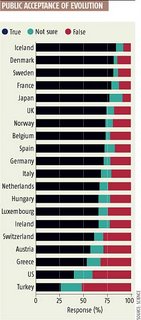Evolutionary quality
Some more thoughts about "values" as providing a descriptive basis of a workable paradigm. In retrospective terms, we could say that evolution is the creation of valuable information through selective replication and innovation. That is, information - and its phenotypic extension - that survives environmental pressures becomes valuable by virtue of its being successfully propagated.
On this subject I found this short article at http://pespmc1.vub.ac.be/EVOLVAL.html which pursues this same naturalisation of values:
While primary values cannot be derived from nature, they must be consistent with evolution and natural selection, the primary mechanism that has generated all of nature. This mechanism has an implicit value, as selection entails a preference for certain states of affairs over others. Natural selection can be seen to strive to maximize survival or fitness. Thus we take survival, in the most general sense, as the primary value. If we also take into account reproduction, the more general evolutionary value is fitness: maximizing the probability that our genes (or memes) will still be around in future generations. Because of the "Red Queen Principle" the seemingly conservative value of survival necessarily entails continuing progress, development, or growth: if you do not innovate by constantly trying out new variations, you will sooner or later lose the competition with those that do innovate. Thus we can from there derive the ultimate good as the continuation of the process of evolution itself, in the negative sense of avoiding evolutionary "dead ends" and general extinction, in the positive sense of constantly increasing our fitness, and thus our intelligence, degree of organization and general mastery over the universe.
Pirsig's MOQ takes the same two basic aspects of value, or quality, described here - survival and progression - and builds everything else from them. They are described as static quality and dynamic quality respectively. "Dynamic" is usually capitalised to signify its priority, both epistemological and ontological, but I don't want to get into that here other than to say that if natural selection is the mechanism that creates everything through replication and innovation, then some kind of innovation has to have come first. Anyway, Pirsig puts the "priority" of innovation like this:
The decisions that directed the progress of evolution are, in fact, Dynamic Quality itself.....Naturally there is no mechanism toward which life is heading. Mechanisms are the enemy of life. The more static and unyielding the mechanisms are, the more life works to evade them or overcome them.
(Pirsig, Lila, Ch11)
(Note: So Dynamic Quality has to cover all aspects of variation such as replication errors and mutations and the "spur of the moment" selection of parental genes that are spliced to create the DNA of their offspring as well.)
As is an ever more popular thesis, Pirsig then applies evolutionary principles to everything, using his own static-Dynamic vocabulary to give us a rich description of the process:
The division of all biological evolutionary patterns into a Dynamic function and a static function continues on up through higher levels of evolution. The formation of semipermeable cell walls to let food in and keep poisons out is a static latch. So are bones, shells, hide, fur, burrows, clothes, houses, villages, castles, rituals, symbols, laws and libraries. All of these prevent evolutionary degeneration. On the other hand, the shift in cell reproduction from mitosis to meiosis to permit sexual choice and allow huge DNA diversification is a Dynamic advance. So is the collective organization of cells into metazoan societies called plants and animals. So are sexual choice, symbiosis, death and regeneration, communality, communication, speculative thought, curiosity and art. Most of these, when viewed in a substance-centered evolutionary way, are thought of as mere incidental properties of the molecular machine. But in a value-centered explanation of evolution they are close to the Dynamic process itself, pulling the pattern of life forward to greater levels of versatility and freedom.
Sometimes a Dynamic increment goes forward but can find no latching mechanism and so fails and slips back to a previous latched position. Whole species and cultures get lost this way. Sometimes a static pattern becomes so powerful it prohibits any Dynamic moves forward. In both cases the evolutionary process is halted for a while. But when it's not halted the result has been an increase in power to control hostile forces or an increase in versatility or both. The increase in versatility is directed toward Dynamic Quality. The increase in power to control hostile forces is directed toward static quality. Without Dynamic Quality the organism cannot grow. Without static quality the organism cannot last. Both are needed.
(ibid. Ch11)
The questions I have at the moment are:
Is anything added to the theory of evolution by all this talk of values?
Does our understanding of values benefit from their linking to evolution?
Are values implicit in evolutionary theory?
With respect to the last question, if value are implicit in evolutionary theory and evolutionary theory can be applied to everything then values can be applied to everything.



